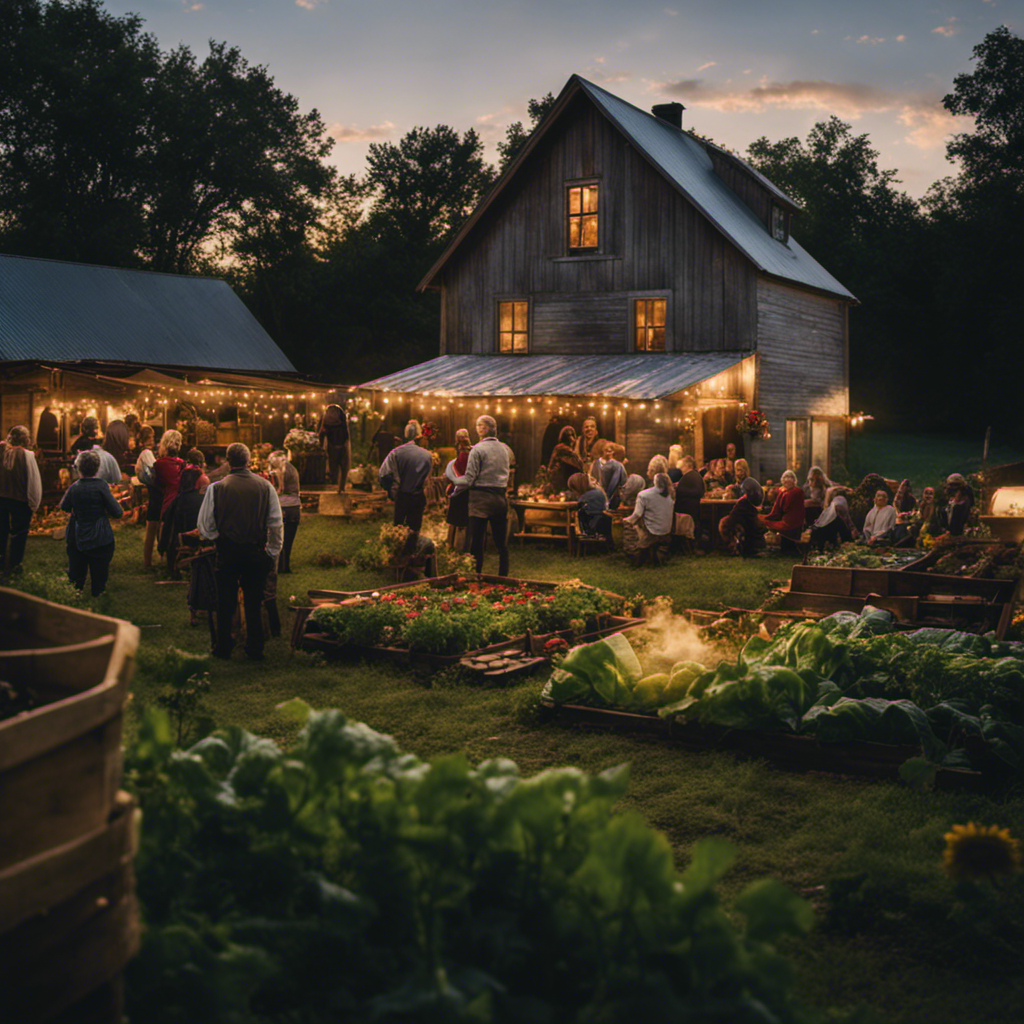We’ve all been captivated by tales of rural life: the charming farmhouse, the abundant garden, and the sense of self-reliance.
But what does this shift to rural living really mean for social interaction and community dynamics?
In this article, we delve into the potential challenges and benefits of rural homesteading, exploring how it impacts traditional values, mental health, and relationships.
Join us as we navigate the complexities of balancing independence and interdependence in these tight-knit communities.
Key Takeaways
- Building a supportive network and engaging in community involvement enhances social interaction and community resilience in rural homesteading.
- Isolation in rural homesteading can be combated by creating virtual connections through online platforms and social media, as well as organizing local community events to foster unity and connectedness.
- Preservation of traditional values and cultural heritage is integral to rural homesteading, promoting self-expression, creativity, collaboration, and cooperation.
- Rural homesteading has an impact on mental health and well-being, with a strong sense of belonging, support from neighbors, and community engagement improving overall well-being and happiness.
Community Involvement in Rural Homesteading
We’re excited to see how our community’s involvement in rural homesteading will strengthen our bond and enhance our self-sufficiency. Building a strong community is an essential aspect of rural homesteading. Through shared resources and collective efforts, we can create a supportive network that fosters collaboration and resilience.
One key way to achieve this is by organizing community workdays, where individuals come together to help each other with tasks such as building structures, tending gardens, or raising livestock. This not only lightens the workload but also encourages camaraderie and a sense of belonging. Additionally, the sharing of resources, such as tools, seeds, and knowledge, promotes a culture of reciprocity and mutual assistance.
Isolation: A Potential Challenge in Rural Homesteading
Isolation can be a potential challenge in rural homesteading, as the lack of proximity to neighbors and urban amenities can limit social connectivity.
Research has shown that individuals in rural areas often rely on building strong support networks within their communities to combat the effects of isolation.
These networks can provide emotional support, assistance with practical tasks, and opportunities for social interaction, helping individuals to feel connected and supported in their rural homesteading journey.
Social Connectivity in Isolation
Living remotely, we’ve found that maintaining social connectivity can be challenging during times of isolation. Building virtual connections has become crucial in order to stay connected with friends, family, and the wider community. Through online platforms and social media, we’ve been able to foster local traditions by sharing stories, recipes, and cultural practices. These virtual connections help us feel a sense of belonging and keep our community spirit alive.
However, while virtual connections are valuable, they can’t fully replace face-to-face interactions. That’s why building rural support networks is essential. By reaching out to our neighbors, participating in community events, and joining local organizations, we can create a strong support system that not only helps us during times of isolation but also enhances our overall well-being and sense of community.
Building Rural Support Networks
Although it can be challenging, we’ve found that building rural support networks is crucial for fostering a sense of community in rural homesteading.
Building local networks not only enhances social interaction but also contributes to community resilience.
We’ve identified two key sub-topics within this discussion:
-
Information sharing and resource exchange: In rural areas, where access to services and resources may be limited, building local networks allows for the sharing of valuable information and resources. This can include knowledge about farming techniques, equipment sharing, or even assistance during emergencies.
-
Collaborative projects and community events: By coming together and organizing collaborative projects and community events, rural homesteaders can strengthen their sense of community. These activities not only promote social interaction but also foster a shared sense of purpose and belonging.
By actively building these local networks, rural homesteaders can enhance community resilience and create a support system that benefits everyone involved.
This, however, raises the question of dependence on neighbors: the pros and cons of relying on others.
Dependence on Neighbors: Pros and Cons
We greatly appreciate the support and assistance we receive from our neighbors, but sometimes it can be challenging to strike a balance between dependence and maintaining our own independence.
Community collaboration and neighborly assistance are vital for fostering a strong and supportive environment. However, relying too heavily on our neighbors can undermine our individual self-reliance and hinder the development of our own skills and capabilities.
While it’s beneficial to have a close-knit community that can provide help and resources when needed, it’s equally important to maintain a sense of autonomy and self-sufficiency. Research shows that an overreliance on neighbors can lead to a decreased sense of personal agency and may result in a loss of motivation to develop one’s own abilities.
Therefore, it’s crucial to find a balance where we can benefit from community collaboration while also preserving our own independence.
Impact of Rural Homesteading on Traditional Values
Our transition to rural homesteading has had a profound influence on our traditional values, shaping our perspectives on self-sufficiency and community interdependence.
As we immerse ourselves in the homesteading lifestyle, we’ve come to appreciate the importance of preserving our cultural heritage and passing it down to future generations. Homesteading values, such as resourcefulness, resilience, and sustainability, have become integral to our way of life.
Our commitment to living off the land has fostered a deep sense of respect for nature and an understanding of the interconnectedness of all living things. Furthermore, our interactions with fellow homesteaders have reinforced the significance of community support and cooperation. Through shared knowledge and resources, we’ve created a strong network that not only enhances our self-sufficiency but also promotes the preservation of traditional practices. This cultural preservation is vital in maintaining our unique identities and ensuring a sustainable future for rural communities.
However, despite the many benefits of rural homesteading, one challenge we face is the lack of entertainment venues in rural areas.
The Lack of Entertainment Venues in Rural Areas
The lack of entertainment venues in rural areas is a significant challenge that contributes to social isolation. Research shows that rural communities often have limited access to cultural and recreational activities, leading to feelings of boredom and disconnect.
This lack of entertainment options highlights the importance of finding creative local activities and fostering community engagement to address the social needs of rural residents.
Social Isolation in Rural Areas
Living in rural areas, we often struggle with a scarcity of social events and entertainment venues, leading to feelings of isolation. This lack of community engagement can have a significant impact on our mental health and well-being. Research has shown that individuals living in rural areas are more likely to experience higher levels of social isolation and loneliness compared to their urban counterparts. These feelings of isolation can contribute to various mental health issues, such as depression and anxiety.
Moreover, limited opportunities for social interaction can hinder the development of strong support networks, which are crucial for maintaining good mental health. It’s essential for rural communities to prioritize the creation of social events and venues to foster a sense of belonging and improve overall well-being.
-
The impact of social isolation:
-
Increased risk of mental health issues
-
Lack of support networks and resources
-
Importance of community engagement:
-
Enhances social connections and relationships
-
Improves overall mental health and well-being.
Creative Local Activities
We’re always looking for creative ways to enjoy our rural surroundings and engage with our local community, especially when it comes to finding activities and entertainment options in our area.
One popular avenue for community engagement is through homemade crafts and local festivals. Homemade crafts provide an opportunity for individuals to showcase their creativity and talent while also supporting the local economy. By purchasing and promoting homemade crafts, we can contribute to the livelihood of local artisans and foster a sense of community pride.
Local festivals, on the other hand, bring people together in celebration of shared traditions and interests. They create a sense of belonging and provide a platform for showcasing local culture, talent, and products.
These activities not only enhance our quality of life, but also strengthen the social fabric of our community. It’s through these creative outlets and community events that we can forge meaningful connections and build a strong sense of belonging, which is crucial for the overall well-being and development of our rural community.
Importance of Community Engagement?
In order to overcome the lack of entertainment venues in rural areas, we actively seek out opportunities for community engagement through organizing and participating in local events. Community engagement plays a vital role in fostering social interaction and enhancing community dynamics.
Through our research, we’ve found that community gardens and volunteer programs are two effective ways to promote community engagement in rural areas.
-
Community Gardens:
-
Encourage collaboration and cooperation among community members in cultivating and maintaining shared green spaces.
-
Provide a platform for knowledge exchange and skill-sharing related to gardening and sustainable practices.
-
Volunteer Programs:
-
Offer individuals the chance to contribute their time and skills to meaningful causes within their community.
-
Create a sense of belonging and shared responsibility among participants, leading to increased social cohesion.
Less Diversity in Rural Homesteading Communities
Our experiences have shown us that rural homesteading communities often lack the diversity needed for a vibrant and inclusive environment. Community diversity and cultural immersion are critical components of a thriving society, fostering empathy, understanding, and a sense of belonging.
However, in many rural homesteading communities, the lack of diversity is evident. Research has indicated that these communities tend to attract individuals who share similar backgrounds, values, and lifestyles. While this may create a sense of camaraderie among residents, it also limits exposure to different perspectives and experiences.
Without a diverse population, rural homesteading communities miss out on the opportunity to learn from one another and create a truly inclusive environment. This lack of diversity can hinder social interaction, impede personal growth, and limit the community’s ability to address complex issues effectively.
To cultivate a more vibrant and inclusive environment, it’s crucial for rural homesteading communities to actively seek and embrace diversity.
Homemade Entertainment in Rural Homesteading
Let’s gather around the bonfire tonight and enjoy some homemade entertainment in our rural homesteading community. In our community, homemade crafts and local traditions play a significant role in bringing us together and fostering a sense of unity.
The act of creating homemade crafts not only allows individuals to showcase their creativity but also serves as a way to preserve and pass down local traditions from one generation to the next. This form of entertainment has become an integral part of our social interactions and community dynamics.
-
Benefits of Homemade Entertainment:
-
Promotes creativity and self-expression
-
Strengthens community bonds
-
Impact on Social Interaction and Community Dynamics:
-
Encourages collaboration and cooperation
-
Preserves local traditions and cultural heritage
Slow-Paced Social Life in Rural Homesteading
In rural homesteading, the social life often takes on a slow-paced nature due to the limited social opportunities available. With fewer people living in close proximity, interactions with neighbors and community members may be infrequent and require deliberate effort.
This slower pace can impact the development and strength of community bonds, as individuals may not have as many opportunities for spontaneous socialization and shared experiences.
Limited Social Opportunities
We’ve noticed that limited social opportunities can impact our sense of community and belonging in rural homesteading. Building social connections and overcoming loneliness are key factors in creating a thriving and supportive community. However, in rural areas, the options for socializing and creating meaningful connections can be limited. This can be due to factors such as geographic isolation, a smaller population, and fewer organized social activities.
To address these challenges, individuals in rural homesteading communities have found innovative ways to build social connections. Some strategies include:
-
Utilizing technology: People in rural areas are increasingly using social media platforms and online forums to connect with others who share similar interests.
-
Creating local community events: Organizing regular gatherings, such as potlucks, book clubs, or craft nights, can provide opportunities for socializing and building relationships within the community.
Impact on Community Bonds
Despite the slow-paced social life, we actively contribute to strengthening community bonds in rural homesteading through shared activities and regular interactions.
Community engagement plays a critical role in promoting mental health and well-being within these settings. Research has shown that strong community ties can provide individuals with a sense of belonging, support, and purpose, leading to improved psychological resilience and overall life satisfaction.
In rural homesteading, where social opportunities may be limited, actively engaging with our neighbors and fellow community members becomes even more crucial. By organizing communal events, such as potlucks, farmer’s markets, or neighborhood clean-ups, we foster a sense of unity and connectedness.
These shared activities not only enhance social interactions but also create spaces for individuals to come together, share experiences, and support one another, ultimately contributing to improved mental well-being and a stronger sense of community.
Fewer Professional Opportunities in Rural Areas
We’re finding that there are significantly fewer professional opportunities in rural areas, impacting our career prospects and economic stability. As we examine the state of rural communities, it becomes clear that the lack of professional opportunities stems from various factors.
-
Limited access to industries and businesses:
-
Rural areas often lack the presence of major corporations and industries, limiting job options for professionals.
-
The absence of large-scale businesses also reduces the chances for career advancement and higher salaries.
-
Focus on traditional values and industries:
-
In many rural areas, traditional values and industries like agriculture and farming are prioritized over professional sectors.
-
This emphasis on traditional sectors can limit the diversification of the job market, making it harder for professionals to find suitable opportunities.
These factors contribute to the dearth of professional opportunities in rural areas, forcing individuals to seek employment in urban centers, which can lead to a decline in community vitality and economic stability.
The Richness of Communal Support in Rural Homesteading
In rural homesteading, the richness of communal support plays a vital role in the social dynamics of the community. Research has shown that the strong social bonds formed among homesteaders contribute to a sense of belonging and shared responsibility.
This communal support provides numerous benefits, including shared resources, knowledge exchange, and emotional support, creating a cohesive and resilient community.
Social Bonds in Homesteading
Our close-knit homesteading community provides us with numerous opportunities to foster strong social bonds. Community engagement plays a vital role in maintaining our mental health and well-being. Research has shown that active participation in a community can have positive effects on individuals’ mental health, reducing feelings of isolation and providing a sense of belonging.
In our homesteading community, we engage in various activities that promote social interaction and support. Regular community gatherings such as potluck dinners and barbecues allow us to come together and share meals, fostering a sense of camaraderie. Additionally, work parties and group projects provide opportunities for collaboration and teamwork, strengthening our social connections.
Skill-sharing workshops on gardening, animal husbandry, and other homesteading skills are also an integral part of our community. These workshops encourage knowledge exchange and create a supportive learning environment. By sharing our expertise with others, we build trust and deepen our relationships within the community.
Through these community engagement initiatives, we prioritize the well-being of our members and create a supportive network that contributes to our overall mental health.
Benefits of Community Support
As members of a close-knit homesteading community, we’ve experienced firsthand the numerous benefits of community support, such as increased social connections and a sense of belonging. Building relationships within our community has been instrumental in fostering a strong and supportive environment.
Research has shown that individuals who’ve a strong sense of belonging in their community tend to have better overall well-being and mental health. The support we receive from our neighbors and fellow community members not only enhances our daily lives but also helps us overcome challenges that arise in our homesteading journey.
Challenges of Building and Maintaining Relationships in Rural Homesteading
Navigating the limited social opportunities in rural homesteading can be challenging, but by actively reaching out to neighboring homesteaders, we can build and maintain meaningful relationships.
In rural areas, where distances between homesteads can be significant, it’s crucial to find ways to connect with neighbors and foster a sense of community.
Here are some strategies to overcome the challenges and build relationships in rural homesteading:
-
Attend community events: Participating in local community events provides an opportunity to meet and connect with fellow homesteaders. These events can range from farmers markets to agricultural fairs, where you can engage in conversations and share experiences with like-minded individuals.
-
Create a support network: Building relationships with neighbors can create a support network that can be invaluable in times of need. This network can help with tasks such as animal care, sharing resources, or providing assistance during emergencies.
Impact of Rural Homesteading on Mental Health and Well-being
Living in a rural homestead has the potential to positively impact our mental health and overall well-being, as we immerse ourselves in nature and embrace a simpler way of life. Studies have shown that spending time in nature can reduce stress, improve mood, and increase feelings of well-being.
The slower pace of life in rural communities allows for more time spent outdoors, engaging in activities such as gardening, hiking, and farming, which are known to have mental health benefits.
Additionally, the strong sense of community in rural homesteading can provide social support and a sense of belonging, both of which are important for maintaining good mental health. Strategies for mental health in rural homesteading may include connecting with nature, participating in community events, and seeking support from neighbors and friends.
Engaging with the community can provide opportunities for social interaction, which is crucial for mental well-being. However, it’s important to strike a balance between independence and interdependence in rural homesteading communities, as excessive reliance on others can lead to a loss of individual autonomy.
Balancing Independence and Interdependence in Rural Homesteading Communities
In rural homesteading communities, we must find a way to strike a balance between our independence and our interdependence with our neighbors. Achieving community self-sufficiency is a key goal for many homesteaders, as it allows us to rely less on external resources and build resilience. However, it’s equally important to maintain social connections within the community to foster a sense of belonging and mutual support.
To strike this balance, we can implement the following strategies:
-
Encourage skill-sharing and resource exchange within the community:
-
Organize workshops or classes where community members can teach each other valuable skills such as gardening, animal husbandry, or food preservation.
-
Establish a system for sharing tools, equipment, and surplus produce to minimize waste and promote community collaboration.
-
Foster a sense of community through regular social events and gatherings:
-
Organize potluck dinners, community picnics, or local festivals to bring neighbors together and strengthen social bonds.
-
Create community-based projects such as building a playground or maintaining shared spaces, which provide opportunities for collaboration and interaction.
Strategies for Fostering Social Interaction in Rural Homesteading Communities
To strengthen our sense of community, we can organize regular potluck dinners or local festivals, fostering social interaction in rural homesteading communities. Building social connections and creating community events are crucial in rural areas where individuals often live in relative isolation.
Research has shown that social interaction plays a vital role in promoting overall well-being and happiness among individuals. In rural homesteading communities, where self-sufficiency and independence are prized, it’s essential to find ways to balance these values with the need for social connection and support.
Regular potluck dinners provide an opportunity for community members to come together, share food, and engage in meaningful conversations. Local festivals, on the other hand, offer a chance for residents to showcase their talents, celebrate local traditions, and strengthen community bonds.
Frequently Asked Questions
How Does the Lack of Entertainment Venues in Rural Areas Impact Social Interaction in Rural Homesteading Communities?
The limited entertainment options in rural areas can impact community cohesion by reducing opportunities for social interaction. However, technology plays a role in fostering social interaction in rural homesteading communities, providing virtual platforms for communication and connection.
What Are the Challenges of Building and Maintaining Relationships in Rural Homesteading Communities?
Challenges in building and maintaining relationships in rural homesteading communities include isolation and limited social opportunities. These factors can impact social interaction and community dynamics, potentially leading to a sense of disconnect and reduced social cohesion.
How Does Rural Homesteading Impact Traditional Values in the Community?
A shift to rural homesteading can impact traditional values in the community. As people embrace a simpler lifestyle and prioritize self-sufficiency, it may lead to a reevaluation of societal norms and a stronger emphasis on community cooperation and resilience.
What Strategies Can Be Used to Foster Social Interaction in Rural Homesteading Communities?
To foster social interaction in rural homesteading communities, we can employ various strategies. Building community through shared activities and events, creating social support networks, and encouraging open communication are all effective ways to strengthen social bonds and enhance community dynamics.
How Does the Shift to Rural Homesteading Impact Mental Health and Well-Being in Individuals?
How does the shift to rural homesteading impact mental health and well-being in individuals? Does the isolation have negative effects on physical health? Research suggests that the shift can have significant consequences on both mental and physical well-being.
Conclusion
In conclusion, the shift to rural homesteading brings about various challenges and changes to social interaction and community dynamics.
While isolation and dependence on neighbors may pose challenges, the impact on traditional values and mental health shouldn’t be overlooked.
Moreover, the lack of entertainment venues in rural areas further complicates building and maintaining relationships.
Therefore, it’s crucial for rural homesteading communities to strategize and foster social interaction to maintain a balance between independence and interdependence.










